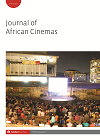-
f Active audiences of Nollywood video-films: An experience with a Bukusu audience community in Chwele market of Western Kenya
- Source: Journal of African Cinemas, Volume 6, Issue 1, Apr 2014, p. 71 - 83
-
- 01 Apr 2014
Abstract
This article explores the distinctively heuristic approach to Nollywood video-films used by a Bukusu-speaking audience community in Chwele Market, Western Kenya. As this audience views video-films on witchcraft in particular – which tend to be very popular – the reception process becomes remarkably dialogic. The process illuminates the audience’s adaptation of the video-films into their sociocultural world. Most important is that this audience seems to not only relish, but speak back to, representations of magical power, especially as it is symbolized by snakes and women. I have argued that as they speak back to the visual images and narrative representations they not only reflect on and ‘speak back’ to critical aspects of their society and culture but also illuminate the cultural assumptions and ideological positions informing the iconography and social imagination of the video-films. Furthermore, this ‘speaking back’ takes the form of storytelling, in which the audience spontaneously generates oral narratives that sometimes diverge from and other times converge with the video-film’s content. I have further argued that the reception experience can be perceived as a medium of oral performance, and in this light I have explored the use of various formal characteristics of oral performance such as the use of symbolism, imagery, irony and hyperbole during a screening of Snake Girl I (Umeasor, 2008). It is significant that these formal stylistic features are appropriated from the visual and narrative form of the video-film and reconstructed in a manner that creates an exchange between, on the one hand, their screen representation and, on the other, the way in which the audience uses them in their reception stories. Also significant is the ‘dialogue’ at the level of imagery and symbolism between what is represented in the video-film and the one that the audiences have been socialized into. In the end, I have argued that the process of Nollywood video-film audience reception I observed at Chwele Market of Western Kenya can be read as the adaptation of the audience reception experience to fit in the frame of an oral performance.


